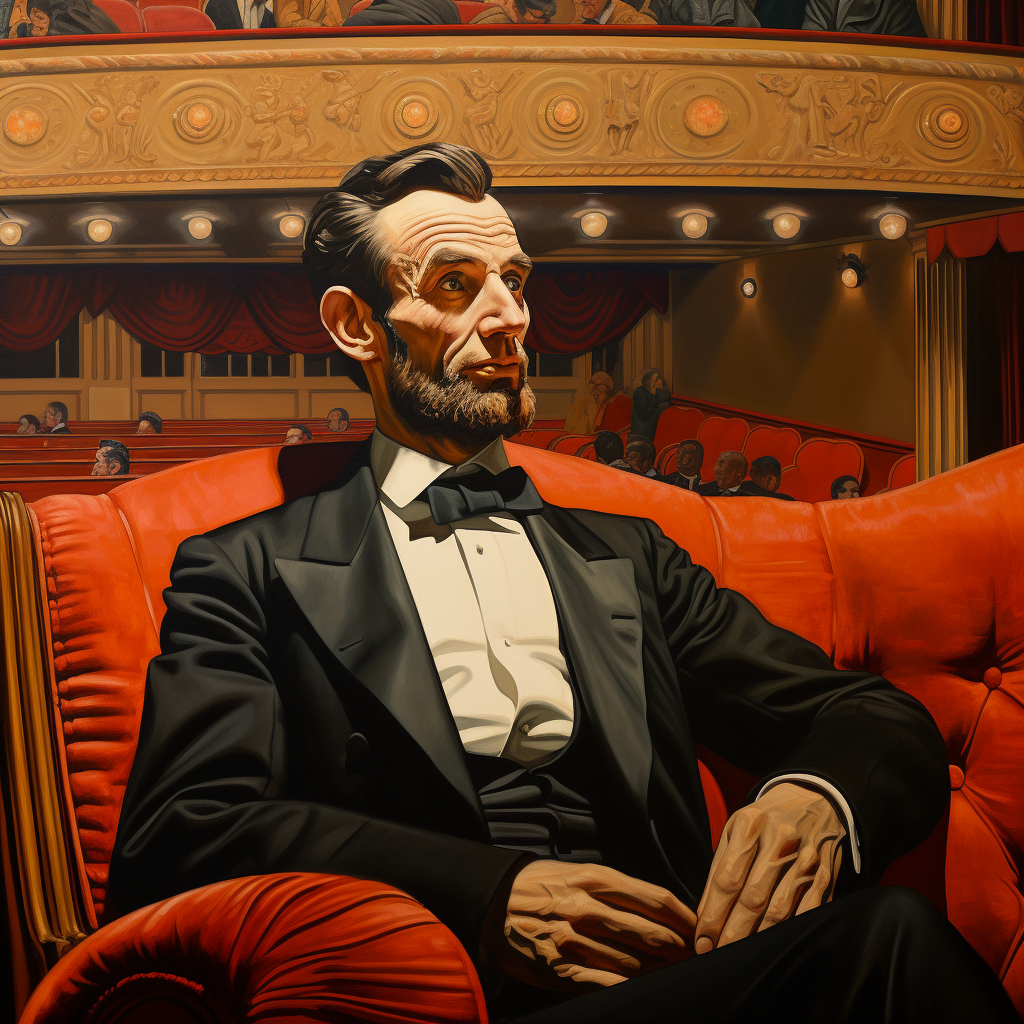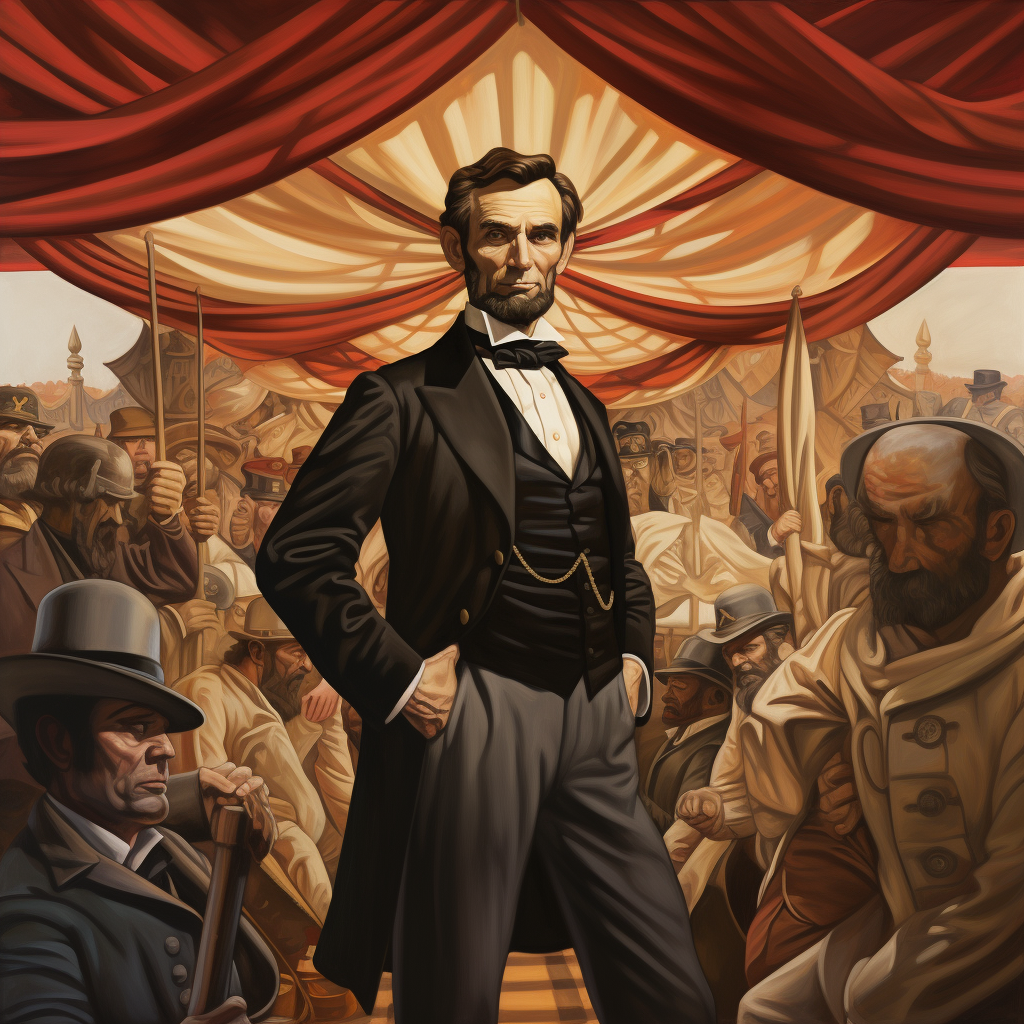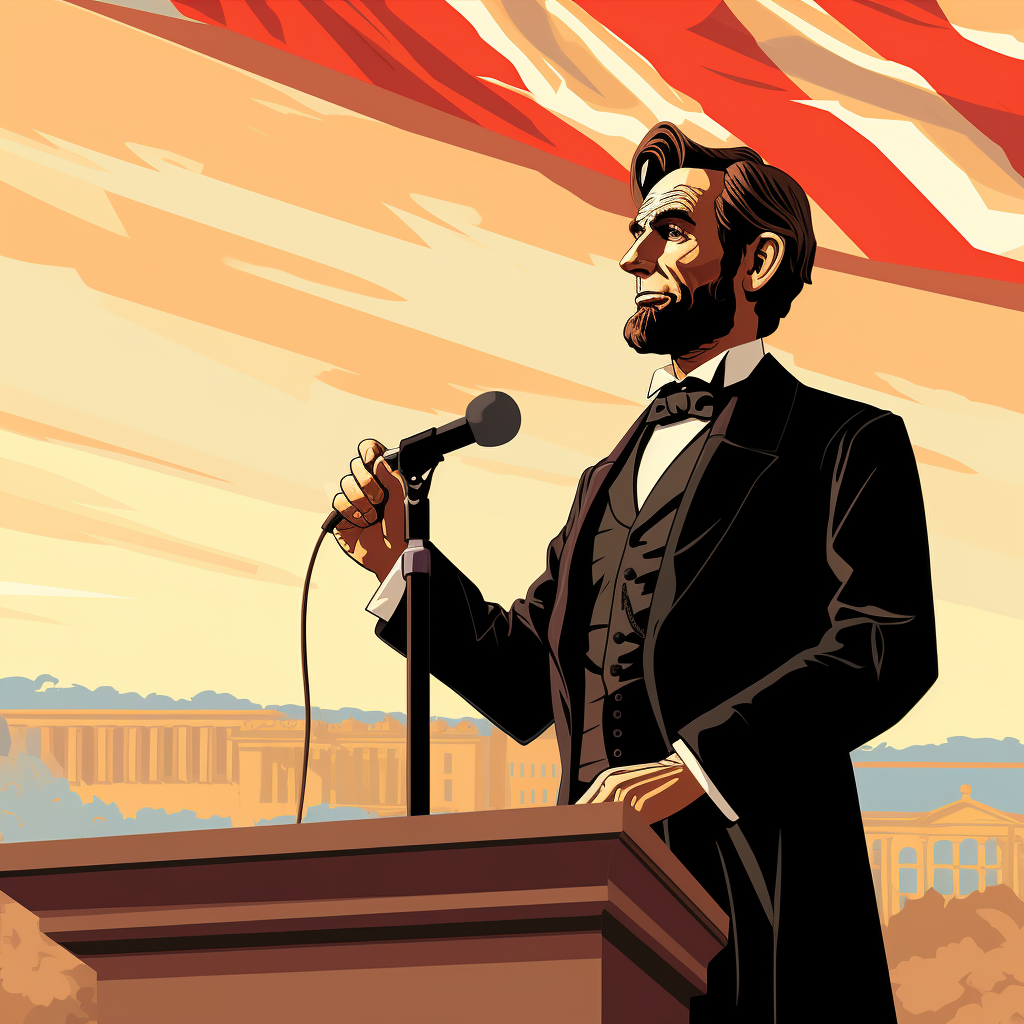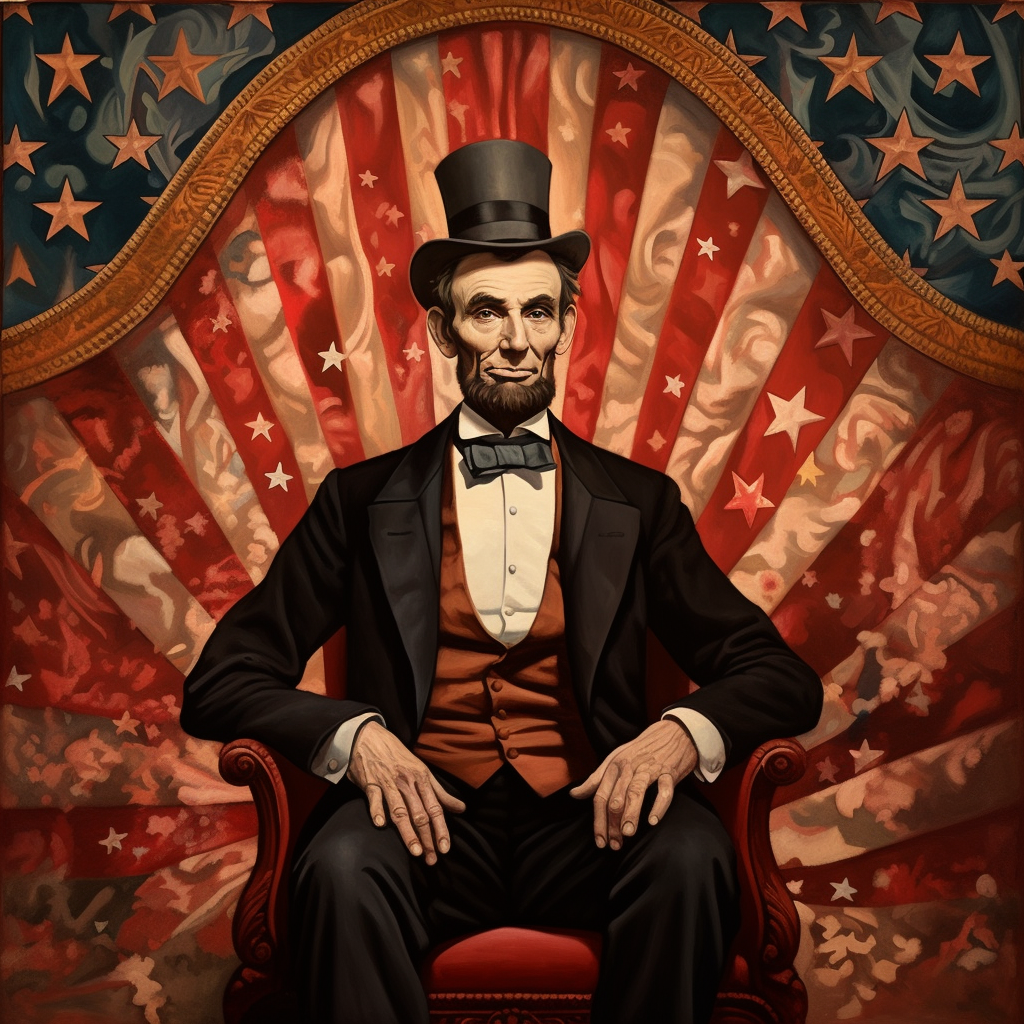PROFILE - Abraham Lincoln

Abraham Lincoln, the 16th President of the United States, is often remembered as a symbol of leadership, resilience, and moral courage.
Studying Abraham Lincoln's life provides valuable insights into his leadership qualities, such as his commitment to principles, willingness to listen, sense of humor, empathy, and willingness to take responsibility.
His unwavering commitment to justice and equality during the tumultuous period of the American Civil War continues to serve as an inspiration for leaders worldwide.
In this profile post, we’ll delve into the depths of the leadership of Lincoln, his transformational leadership style, his ability to persuade and inspire, and the key moments that defined his presidency.
- President Abraham Lincoln was a visionary transformational leader, using empathy and strategic intellect to navigate complex situations during his presidency.
- He built strong relationships through trust and care, as well as masterful storytelling that captivated audiences.
- Despite facing adversity throughout his life, he persevered to become President of the United States due to his unique leadership style which culminated in a Union victory and cemented him as one of America’s greatest presidents.
President Abraham Lincoln - Embodying Transformational Leadership

Abraham Lincoln’s transformational style of leadership was characterized by a visionary perspective, an ability to empathize with others, and a sharp strategic mind, all of which helped him lead the nation through the difficult times of the American Civil War.
His leadership qualities continue to serve as an inspiration for business leaders and politicians alike. Harvard Business School often cites Lincoln as an example of effective leadership that great leaders can learn from.
We’ll further explore Lincoln’s transformational leadership, focusing on his visionary approach, empathetic influence, and strategic intellect.
Visionary Approach
President Abraham Lincoln had a truly visionary approach to his presidency, setting clear goals and working tirelessly to achieve them. He used his speeches to frame the stakes of change and empowered his leadership through dialogue with American society.
Lincoln’s vision for the preservation and reconstruction of the Union, as well as his commitment to upholding the ideals of equality, propelled him to issue the Emancipation Proclamation on January 1, 1863, which declared that all persons held as slaves in designated rebellious areas would be eternally free.
Lincoln's commitment to preserving the Union and upholding equality was unwavering, demonstrating his dedication to his principles despite adversity.
His commitment to preserving the Union, coupled with his strategic use of available resources, significantly influenced the Civil War’s outcome, from battlefield victories to strategic planning.
Empathetic Influence
Lincoln's empathy allowed him to connect with people on a personal level and gain their trust and support. He visited hospitals to show his support for those in need, understood the challenges others faced, and even showed empathy towards animals.
Lincoln communicated his values and beliefs through stories and parables, fostering an atmosphere of trust and collaboration essential for transformational leadership.
This deep connection fostered trust and loyalty, thereby galvanizing his army and the nation towards achieving a shared objective.
Strategic Intellect
Lincoln’s strategic intellect enabled him to make informed decisions and navigate complex situations during his presidency. He put in the work to learn military strategy and redefined the role of commander-in-chief, allowing him to communicate with commanders on the same level and effectively engage with the Confederate Army. Key decisions, such as issuing the first code of conduct to support Generals Grant and Sherman in their military campaigns, demonstrate Lincoln’s strategic thinking and commitment to preserving the Union.
His awareness of the importance of defeating the enemy, rather than simply conquering territory, shaped the course of the Civil War, much like the strategic thinking of William Seward.
The Power of Persuasion

Lincoln’s persuasive abilities were rooted in building trust and rapport with others and using storytelling to convey his message. Lincoln’s ability to make friends and show genuine care for their well-being convinced many to support him throughout his political career.
Lincoln's sense of humor played a crucial role in building relationships and trust with his followers.
We’ll delve into how Lincoln fostered trust and rapport, and how his exceptional storytelling skills simplified complex ideas into relatable and memorable narratives.
Building Trust and Rapport
Lincoln worked on building trust and rapport by:
- Taking the time to get to know people
- Really listening to their worries
- Showing that he truly cared about their well-being
- Connecting with his staff from the highest ranks to the lowest
- Demonstrating Lincoln's willingness to listen to their concerns and ideas
- Being always accessible and actively engaging
These actions helped him build trust and rapport.
His genuine care for people’s well-being was evident in his actions, such as his compassion for those who faced mental health issues and his support for their spiritual well-being. Lincoln’s ability to build trust was key to his successful leadership.
Masterful Storytelling
Lincoln's masterful storytelling allowed him to communicate complex ideas in a relatable and memorable way. He was known for his great storytelling ability, sharing captivating tales that made it easy for him to communicate his ideas and rally support for his causes. Stories such as his encounter with a bear during the Black Hawk War and the story of the perfect woman showcased his storytelling skills and amplified his influence as a leader.
Lincoln employed his ability to share practical wisdom in an entertaining way, which helped him connect with people on a deeper level and inspired them to follow his vision.
Overcoming Adversity: Lincoln's Path to the Presidency
Lincoln’s path to the presidency was marked by humble beginnings and political ups and downs, which shaped his leadership style. Eventually, the Civil War was a result of Lincoln's unwavering principles, leading to the secession of several Southern states. We’ll examine how Lincoln’s early life and career challenges molded his leadership approach, leading to his unique transformational style.
Humble Beginnings
Lincoln’s humble beginnings and self-education instilled in him the values of hard work, perseverance, and lifelong learning. With no formal education, Lincoln borrowed law books from a mentor and taught himself by studying alone.
This self-made approach to education shaped his character and laid the foundation for his future political career, demonstrating that determination and continuous personal development can lead to great success. Studying Lincoln's life provides valuable lessons on how his early experiences contributed to his effective leadership qualities.
We write more about Abe Lincoln’s Humble Beginnings HERE
Political Ups and Downs
Lincoln's political career was characterized by both successes and failures, which taught him resilience and adaptability. He faced challenges in regaining control over the Army and communicating with his generals in a different way. However, instead of giving up, Lincoln used these setbacks as learning experiences and persevered, ultimately becoming a great leader during the Civil War and as President of the United States.
His ability to overcome seemingly impossible obstacles serves as an inspiration for leaders today, providing valuable leadership lessons.
Key Moments in Lincoln's Presidency

Key moments in Lincoln’s presidency include his handling of the Civil War, where he adeptly interacted with military leaders, the Emancipation Proclamation, and the passage of the 13th Amendment. We’ll delve into these defining moments, examining how Lincoln’s leadership during these critical events forever shaped American history.
Handling of the Civil War:
Lincoln's leadership during the Civil War demonstrated his strategic decision-making, resilience, and crisis management skills. He employed various strategies to manage the war, including regaining control of the Army, winning back public opinion, and ensuring smooth operations. His unwavering commitment to the Union's cause and his ability to adapt to changing circumstances played a significant role in the ultimate victory of the Union forces.
Lincoln's leadership during the presidential election and the turbulent time that followed, including his tenure in the White House, solidified his place in history as one of the greatest American presidents.
Stories about Abraham Lincoln and the Civil War are here
The Emancipation Proclamation (1863):

The Emancipation Proclamation (1863) showcased Lincoln's visionary leadership and moral courage in redefining the purpose of the Civil War. Issued on January 1, 1863, the proclamation declared the freedom of all slaves in the Confederate states and set the path for the abolition of slavery in the United States.
We discuss the Emancipation Proclamation's significance and its role as a Civil War turning point HERE.
Passage of the 13th Amendment:
The passage of the 13th Amendment highlighted Lincoln's determination and legislative acumen in abolishing slavery. Approved by Congress on January 31, 1865, and ratified by three-fourths of the states on December 6, 1865, the 13th Amendment abolished slavery and involuntary servitude, except as punishment for a crime.
Lincoln's efforts to pass the amendment and his commitment to the abolition of slavery demonstrate his unwavering dedication to justice and equality.
More on the 13th Amendment and Abe Lincoln's role HERE.
Gettysburg Address
The Gettysburg Address exemplified Lincoln's powerful and inspirational communication skills. Delivered on November 19, 1863, during the dedication of the National Cemetery in Gettysburg, Pennsylvania, the address highlighted the ideals of human equality and the sacrifices made during the Civil War.
Lincoln's eloquent speech at Gettysburg reinvigorated the Union cause and serves as a testament to his ability to inspire and unite a nation.
The fact it still resonates today is phenomenal - information about the Gettysburg Address is here.
Lincoln's Approach to Reconstruction:
Lincoln's approach to Reconstruction focused on national healing and reconciliation amidst deep-seated animosity. His approach included:
- Proclamation of Amnesty and Reconstruction, presented on December 8, 1863
- Offered amnesty to former Confederates who agreed to be loyal to the Union
- Accepted the abolition of slavery
Lincoln's vision for national healing and reconciliation during this tumultuous period in American history showcases his dedication to the greater good of the nation, including Northern Virginia.
Lincoln's Emotional Intelligence
Lincoln’s emotional intelligence was evident in his acceptance of responsibility, balancing personal ambition with national interest, and management of his ‘Team of Rivals’ cabinet. By studying Lincoln's emotional intelligence, one can gain valuable insights into effective leadership and making a positive impact in the world.
We’ll examine Lincoln’s emotional intelligence facets and their contribution to his effective, inspirational leadership.
Accepting Responsibility
Lincoln accepted responsibility for his actions and decisions, fostering a culture of accountability and trust. He was quick to give credit where it was due and accept responsibility when things didn't go as planned. By taking ownership of both his successes and failures, Lincoln demonstrated his humility and commitment to learning from his experiences, ultimately strengthening his leadership and inspiring trust and loyalty from those around him.
Balancing Personal Ambition and National Interest
Lincoln balanced his personal ambitions with the greater good of the nation, demonstrating selflessness and dedication to his country. He prioritized the nation's needs above his own ambitions, striving to preserve the Union and ensure equality for all men.
His ability to put the needs of the nation before his own desires showcases Lincoln's unwavering devotion to the United States and its people.
Management of the Cabinet – 'Team of Rivals':
Lincoln's inclusive leadership style and embrace of diverse perspectives were evident in his management of the cabinet, which included political rivals. He strategically appointed individuals with different backgrounds and political affiliations to his cabinet, ensuring access to a wide range of opinions and perspectives. This diversity of viewpoints helped Lincoln make better decisions and handle the difficulties of his presidency.
Lincoln's ‘Team of Rivals' approach, as reported by the New York Tribune, demonstrates his commitment to leveraging differing perspectives for the greater good.
Assassination and Legacy:

Lincoln's assassination and legacy continue to impact the nation, as his unwavering leadership serves as an inspiration for future generations.
Lincoln was assassinated on April 14, 1865, by John Wilkes Booth, a fanatic proslavery advocate, as an act of revenge for the Confederacy's defeat in the American Civil War.
We contemplate the ramifications of Lincoln's assassination on the nation and his lasting legacy as a leader HERE.
Abraham Lincoln's transformational leadership style, visionary approach, empathetic influence, and strategic intellect guided the nation through the turbulent times of the American Civil War.
His unwavering dedication to justice and equality, powerful communication skills, and emotional intelligence serve as an inspiration for leaders across the globe. As we continue to learn from Honest Abe's remarkable journey, let us remember the values he upheld and strive to embody his selfless dedication to the greater good of our nation and the world.
Who is Abraham Lincoln and why was he a great leader?
Abraham Lincoln was a great leader, being the 16th President of the United States during whose term the economy was modernized, the Union was held together through the American Civil War, and slaves were freed with the Emancipation Proclamation.
How did President Lincoln use transformational leadership?
Abraham Lincoln used transformational leadership through his compassion, stability, hope and empathy to create a strong followership. He appealed to the higher moral values of his troops by providing a greater vision of freedom and justice. Furthermore, Lincoln was adept at connecting with people and building relationships of trust to enroll them in the war effort.
Was Lincoln a Democratic leader?
Although Abraham Lincoln was a Republican, he worked with both Democrats and Republicans to achieve his objectives and ultimately had friends and opponents from both parties.
How did Lincoln use servant leadership?
Abraham Lincoln exemplified servant leadership by exercising humility and exhibiting empathy with his constituents and preserving the Union during the Civil War, as well as freeing Southern slaves. His actions serve as a prime example of servant leadership behavior.
What did Lincoln do to make him a leader?
Abraham Lincoln showed true leadership by setting an example and making the ultimate sacrifice. He demonstrated this by always being willing to do what he was asking of others, showing his commitment to the Union cause.



